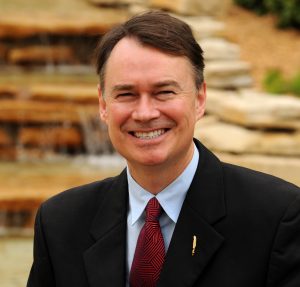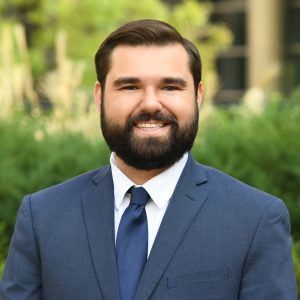Oklahoma Bar Journal
Each Roll of the Dice and Spin of the Wheel:1
The Future of Oklahoma Tribal-State Gaming Compacts
By Jennifer N. Lamirand, Mike McBride III and Greg Buzzard

bezidroglio | #21346574 | stock.adobe.com
While the Supreme Court’s landmark decision in McGirt v. Oklahoma2 has consumed much oxygen in the past two years, ongoing disputes over the negotiation of gaming compacts between tribal nations and the state of Oklahoma, which underpin Oklahoma’s lucrative tribal gaming industry, also have the ability to make impactful change. In July 2019, Oklahoma Gov. Kevin Stitt challenged tribal nations by suggesting that their long-standing gaming compacts, based on a Model Tribal Gaming Compact codified in Oklahoma law (the Model Compact), would soon expire and renegotiations must commence immediately. Several of Oklahoma’s tribes and state leaders disagreed, and, by the end of 2019, lawsuits ensued.
By mid-2020, the U.S. District Court for the Western District of Oklahoma had determined the existing gaming compacts, based on the Model Compact, renewed for a 15-year term, a conclusion Gov. Stitt did not appeal. The Oklahoma Supreme Court had also concluded that Gov. Stitt did not have the authority to enter into several new compact agreements negotiated with a handful of Oklahoma tribes that contained terms not found in the Model Compact. However, challenges to the validity of those new compacts continued, and another case, currently pending in the U.S. District Court for the District of Columbia, will soon resolve questions about the status of those compacts as well as their conformance with legal requirements for tribal-state gaming compacts in Oklahoma. This article provides some general background on tribal-state gaming compacts, recaps the history of recent litigation surrounding Oklahoma gaming compacts and provides some thoughts on what happens next.
THE LEGAL BACKGROUND ON TRIBAL-STATE GAMING COMPACTS
Tribal nations have engaged in various forms of social games throughout their histories. Tribes, including those in Oklahoma, have also offered types of gaming as a source of income for many years, with commercial bingo beginning in the late 1970s. These forays into the controversial gambling market led to the pivotal 1987 decision in California v. Cabazon Band of Mission Indians, where the United States Supreme Court held that the state of California and a California county did not have the ability to enforce their gambling laws and regulations on tribal bingo and card room operations on the reservations of the Cabazon and Morongo Bands of Mission Indians (or to prohibit those operations).3 Congress immediately responded by enacting the Indian Gaming Regulatory Act (IGRA) in 1988.4
IGRA provides a general structure for the regulation of gaming on “Indian lands” as defined within the act.5 It divides types of games into three classes, each with a different form of regulation. Class I gaming includes social games played for prizes of minimal value and traditional forms of gaming occurring at tribal ceremonies or celebrations, and tribes have exclusive jurisdiction over the regulation of these games.6 In general, although the definition contains more nuances, Class II gaming primarily consists of bingo games and games similar to bingo (including electronic forms).7 Class II gaming also falls within the jurisdiction of the tribes; however, IGRA does require each tribe to pass a tribal gaming ordinance, which applies certain regulatory requirements, and to get approval of that ordinance by the National Indian Gaming Commission (NIGC).8 Class III gaming includes all forms of gaming that do not fall within the definitions of Class I or Class II gaming, such as lucrative, casino-style slot machines, ball and dice games, etc.9 Class III gaming again requires the passing of a tribal ordinance, but it also requires tribes to conduct Class III activities “in conformancewith a Tribal-State compact enteredinto by the Indian tribe and the State … that is in effect.”10
IGRA identifies a list of permissible subjects for compact negotiations between a tribal nation and a state.11 For example, the parties to a compact can allow for a state to make some assessment against Class III gaming revenues to offset the costs of any state regulation needed, but IGRA makes clear that it does not provide “a State authority to impose any tax, fee, charge, or other assessment upon an Indian tribe … to engage in a class III activity.”12 In order to comply with this provision, any fee or payment to the state, outside of the basic regulatory cost assessments, must represent an exchange for a quantifiable benefit from the state. A tribal-state gaming compact takes effect upon the publication of a notice of approval of the compact by the secretary of the Interior in the Federal Register.13
Class III gaming arrived in Oklahoma in 2004. State, tribal and industry forces (including the horse racing industry, one of the few examples of legal gaming in Oklahoma at the time) united to pass the State-Tribal Gaming Act through a voter referendum.14 Through the State-Tribal Gaming Act, the state set out the precise terms of its offer for a gaming compact to allow Class III gaming (including specified games) to each federally recognized tribe within Oklahoma: the Model Compact.15 Thereafter, Oklahoma tribes interested in Class III gaming could simply accept the terms of the Model Compact without the torturous negotiations often required in other states.
The Model Compact included a provision that created an initial term to expire Jan. 1, 2020, absent an automatic renewal for additional 15-year terms if certain conditions were met.16 It also required tribes to pay “exclusivity fees” to the state, calculated as a portion of gaming revenue, in exchange for a promise not to “permit the operation of any additional form of gaming by any such organization licensee, or change its laws to permit any additional electronic or machine gaming within Oklahoma …”17 About 33 tribal nations within Oklahoma entered into compacts based on the Model Compact, and these tribes have paid over $1.6 billion in exclusivity fees to the state of Oklahoma since 2006.18 These operations support approximately 30,000 jobs (many in rural locations) and generate millions of dollars in income taxes that also go to the state.19

blende40 | #71847121 | stock.adobe.com
THE DISPUTE OVER RENEWAL OF THE ORIGINAL COMPACT TERM
Kevin Stitt was sworn in as governor of Oklahoma on Jan. 14, 2019. When Gov. Stitt took office, he “inherited letters from tribes”20 regarding a crucial date for the multibillion-dollar Oklahoma tribal gaming industry: Jan. 1, 2020. Part 15(B) of the Model Tribal Gaming Compact, which governs all Class III, casino-style gaming in Oklahoma, provided that all gaming compacts “will expire on January 1, 2020 …”21 The same provision, however, allowed for the compacts to “automatically renew for successive additional fifteen-year terms” under some circumstances and allowed either party to request to renegotiate certain terms relating to exclusivity fees within 180 days of the expiration date.22 Gov. Stitt became the first Oklahoma governor to confront questions about the meaning of this renewal provision and whether to ask to renegotiate the successful Model Compact undergirding a large chunk of Oklahoma’s economy.
Seven months after taking office, Gov. Stitt made his position clear in an opinion article published in the Tulsa World.23 He intended to renegotiate the tribal compacts to obtain higher exclusivity fees. Gov. Stitt claimed that fees in tribal compacts in other states ranged from 20% to 25% – far above the 4% to 6% rates codified in the Model Compact. The governor further asserted that the Model Compact would expire (not renew) on Jan. 1, 2020. Oklahoma tribal nations quickly made clear that they disagreed with Gov. Stitt’s opinions on both issues. Negotiations throughout the remainder of 2019 did not result in any progress toward an agreement about the meaning of the renewal provision in the Model Compact and its implications, much less any other issues.
On Dec. 31, 2019 – the last day before the compacts either expired or renewed – the Cherokee, Chickasaw and Choctaw nations filed suit in the U.S. District Court for the Western District of Oklahoma.24 Six other tribal nations eventually joined the suit as plaintiffs. The tribes made a single claim in their complaint: Their compacts automatically renewed, unchanged, on Jan. 1, 2020. In his answer, Gov. Stitt asked the court to shut down the plaintiff tribes’ Class III gaming, an action targeting millions of dollars in revenue for both the tribal nations, which use that revenue for tribal governmental operations and essential services for their citizens, and the state of Oklahoma, which receives millions of dollars annually from tribal gaming in multiple forms (such as exclusivity fees and income taxes from gaming jobs), earmarked primarily for education.
Following an unsuccessful round of court-ordered mediation, the parties filed cross-motions for summary judgment in May 2020, focusing on the text of Part 15(B) of the Model Compact. The contested provision reads:
This Compact shall have a term which will expire on January 1, 2020, and at that time, if organization licensees or others are authorized to conduct electronic gaming in any form other than pari-mutuel wagering on live horse racing pursuant to any governmental action of the state or court order following the effective date of this Compact, the Compact shall automatically renew for successive additional fifteen-year terms …25
Essentially, if “organization licensees or others” were “authorized to conduct electronic gaming in any form other than pari-mutuel wagering on live horse racing” following the effective date of the compact and if that electronic gaming was “authorized … pursuant to any governmental action of the state or court order,” such action triggered a renewal of the compact term.
Some historical background helps to explain the presence of horse racing in this provision. Before the Model Compact was enacted, Oklahoma permitted pari-mutuel wagering on horse races. The horse racing industry, as part of the compromise enabling tribal Class III gaming within Oklahoma, obtained the ability to offer casino-style games at racetracks like Will Rogers Downs in Claremore and Remington Park in Oklahoma City.26 At the time the Model Compact was enacted, Will Rogers Downs and Remington Park could, therefore, have competed with the nascent tribal casinos. This helps explain why stakeholders incorporated electronic gaming at these racetracks into the Model Compact’s renewal provision.27
In any event, Gov. Stitt and the tribal nations agreed in their summary judgment briefing that Remington Park and Will Rogers Downs, “organization licensees” under Oklahoma law, were authorized to offer electronic gaming, aside from wagering on horse races, on Jan. 1, 2020. However, the parties disagreed on the second issue, whether state governmental action authorized such gaming. Gov. Stitt argued that only the Oklahoma Legislature could authorize racetrack gaming. In his view, the “governmental action of the state” authorizing racetrack gaming was the state law that permitted racetrack gaming at all. That law was enacted before the Model Compact and was accepted by the tribes. The governor, thus, argued the state did not authorize racetrack gaming after the compacts took effect.
The tribes disagreed. They countered that Oklahoma authorized racetrack gaming after the compacts took effect by leaving the law permitting racetrack gaming in effect. They also took issue with Gov. Stitt’s narrow definition of “governmental action.” The tribes noted that an Oklahoma state agency issued gaming licenses to the racetracks each year, which they characterized as governmental action. Finally, they argued that the Oklahoma Legislature changed the law in 2017 to remove limitations on the number of hours per day and week that a racetrack could offer electronic gaming. Even if “governmental action” was defined solely as legislative action, the tribes asserted, the 2017 law qualified.
United States District Court Judge DeGiusti agreed with the tribal nations in a short opinion.28 The court “reject[ed] the State’s narrow view of ‘governmental action,’ which is inconsistent with a common understanding of that term.”29 It reasoned that Oklahoma law permitted a state agency “to authorize organizational licensees (horse racetracks) to conduct electronic gaming,” and no party disputed that the agency had, in fact, issued licenses to the racetracks after the compacts took effect.30 As Oklahoma had permitted racetracks to offer electronic gaming after the compacts took effect, the automatic renewal provision was triggered. The compacts did not expire Jan. 1, 2020; they renewed for a brand-new term.
The court entered judgment in favor of most of the tribal nations on Sept. 23, 2020, answering the tribes’ question.31 The Model Compact automatically renewed, and Class III gaming remains legal in Oklahoma under its auspices. After reportedly spending more than $2 million on legal fees, Gov. Stitt chose not to appeal.32
LITIGATION EXPANDS TO INCLUDE CHALLENGES TO NEW AGREEMENTS WITH FOUR OKLAHOMA TRIBAL GOVERNMENTS
Amidst the federal court litigation focused on the renewal provision of the Model Compact, Gov. Stitt started negotiating new compact agreements with several tribal governments that veered from the accepted provisions of the Model Compact. Those agreements immediately came under fire. Senate President Pro Tempore Greg Treat and Speaker of the House Charles McCall sued the governor in the Oklahoma Supreme Court in April 2020, seeking a determination that the governor lacked authority to enter into two of these agreements, with the Comanche Nation and Otoe-Missouria Tribe of Indians, on behalf of the state and that his actions did not, in fact, bind the state.33 In July 2020, the Oklahoma Supreme Court granted declaratory relief, finding that Gov. Stitt did not have the authority to bind the state with respect to these agreements. The court noted that any gaming compact negotiated by the governor must conform with Oklahoma law enacted by the Legislature, including the State-Tribal Gaming Act.34 By negotiating compacts that authorized forms of Class III gaming not authorized by the State-Tribal Gaming Act, such as house-banked card games, house-banked table games and/or event wagering, these compacts did not conform with the State-Tribal Gaming Act, and the governor exceeded his authority by entering into them.35 The same officials also sued on similar grounds to challenge two agreements entered into by the governor with the United Keetoowah Band of Cherokee Indians (UKB) and Kialegee Tribal Town (KTT) in the same general timeframe. In early 2021, the Oklahoma Supreme Court also found those agreements invalid under Oklahoma law.36
However, the Oklahoma Supreme Court’s decisions did not end the matter. All four of the compacts were submitted to the Department of Interior for approval by the secretary, and, in each case, the secretary took no action on them. This led the tribes involved to consider the agreements “deemed approved” and thus valid authority to support Class III gaming activities.37 The Cherokee Nation, Chickasaw Nation, Choctaw Nation and Citizen Potawatomi Nation filed suit in the U.S. District Court for the District of Columbia against the United States Department of the Interior, its representatives, Gov. Stitt and representatives of the tribes that negotiated new compacts to challenge the validity of these agreements.38
This lawsuit alleges that Gov. Stitt did not have authority to enter into the 2020 agreements with the Comanche Nation, Otoe-Missouria Tribe, UKB and KTT on behalf of the state of Oklahoma because they include terms from outside the Model Compact and, in several ways, violate the provisions of IGRA. As such, the plaintiff tribes argue that IGRA required the Department of the Interior to disapprove the agreements when presented for approval instead of taking no action on them. They assert the secretary’s failure to do so was arbitrary, capricious and contrary to law. The complaint challenges the secretary’s actions pursuant to the Administrative Procedures Act, asks the court to declare the secretary’s lack of action (deemed approval) invalid and asks the court to remand the review of the compacts back to the secretary with a mandate to disapprove them. This case remains pending as of the writing of this article, with multiple dispositive motions on file. The outcome will impact the scope and validity of gaming operations of the Comanche Nation, Otoe-Missouria Tribe, UKB and KTT. It will also clarify whether the procedure for negotiation of tribal-state gaming compact terms used for these agreements comports with the current legal framework.
WHAT COMES NEXT FOR GAMING COMPACTS IN OKLAHOMA
Oklahoma tribal nations that had gaming compacts based on the Model Compact in place as of the end of the initial 15-year term on Dec. 31, 2019, have now entered the next 15-year term of their compacts and can continue to offer the games approved by those compacts. In exchange for the ability to have substantial exclusivity over Oklahoma gaming, as offered through the Model Compact, tribes will also continue to pay exclusivity fees to the tune of over $100 million per year to the state.39 Eighty-eight percent of the exclusivity fees received go to the state’s Education Reform Revolving Fund.40 This status quo for compacts based on the Model Compact will continue until a termination event or some renegotiation of terms occurs. For example, as mentioned, the Model Compact allows for either party to request to renegotiate parts of the exclusivity provision in the Model Compact “within one hundred eighty (180) days of the expiration of this Compact or any renewal thereof …”41 That renegotiation period comes up again in 2034.
Other avenues exist for adding covered games within the legal framework of the State-Tribal Gaming Act and Model Compact as well. In 2018, negotiations and a cooperative effort of the Oklahoma Legislature, Gov. Mary Fallin and multiple tribal nations with gaming compacts led to a statutory amendment with an offer by the state to allow gaming tribes to supplement their existing compacts to make non-house banked table games (such as roulette and craps) a part of their available, covered games under their compact terms. Many tribes accepted that offer and supplemented their compacts accordingly. The same type of procedure can further expand the types of covered games allowed through the Model Compact, but that procedure involves cooperation and compromise. Given the animosity engendered between Oklahoma and tribes by the dispute over the renewal of the compact terms (not to mention the jurisdictional changes wrought by McGirt v. Oklahoma, 591 U.S. –, 140 S. Ct. 2452 (2020), and Oklahoma v. Castro-Huerta, 597 U.S., (2022)), the near-term likelihood of cooperative efforts seems low.
The real question involves whether additional tribal nations with current compacts based on the Model Compact terms will seek to renegotiate some of those terms in the same manner as the Comanche Nation, Otoe-Missouria Tribe, UKB and KTT. The results of the pending federal litigation will either discourage or encourage further individualized negotiations of that nature and clarify their scope. Acceptance of an expansion of terms for renegotiation, to include terms the Model Compact does not include in its renegotiation provision, can impact the field of tribal-state gaming compact negotiations in Oklahoma for years to come.
ABOUT THE AUTHORS
 Jennifer N. Lamirand is a shareholder at Crowe & Dunlevy PC in Oklahoma City and a citizen of the Citizen Potawatomi Nation. She practices in the areas of Indian law and gaming, securities litigation and business litigation. Ms. Lamirand received her J.D. from the University of Notre Dame Law School cum laude and an LL.M. from the London School of Economics and Political Science. She serves as an associate justice on the Citizen Potawatomi Nation Supreme Court and as a member of the ABA Commission on Homelessness and Poverty.
Jennifer N. Lamirand is a shareholder at Crowe & Dunlevy PC in Oklahoma City and a citizen of the Citizen Potawatomi Nation. She practices in the areas of Indian law and gaming, securities litigation and business litigation. Ms. Lamirand received her J.D. from the University of Notre Dame Law School cum laude and an LL.M. from the London School of Economics and Political Science. She serves as an associate justice on the Citizen Potawatomi Nation Supreme Court and as a member of the ABA Commission on Homelessness and Poverty.
 Mike McBride III chairs Crowe & Dunlevy’s Indian Law & Gaming Practice in Tulsa. He is a former tribal supreme court justice, attorney general, federal adjunct settlement judge and law professor. Mr. McBride is also a past chair of the OBA’s and Federal Bar Association’s Indian Law sections. He is a proud papa of a new standard poodle puppy.
Mike McBride III chairs Crowe & Dunlevy’s Indian Law & Gaming Practice in Tulsa. He is a former tribal supreme court justice, attorney general, federal adjunct settlement judge and law professor. Mr. McBride is also a past chair of the OBA’s and Federal Bar Association’s Indian Law sections. He is a proud papa of a new standard poodle puppy.
 Greg Buzzard is a member of Crowe & Dunlevy’s Indian Law & Gaming Practice Group and a citizen of the Cherokee Nation. He received his J.D. from Yale Law School and clerked for Judge Jeffrey L. Viken of the U.S. District Court for the District of South Dakota.
Greg Buzzard is a member of Crowe & Dunlevy’s Indian Law & Gaming Practice Group and a citizen of the Cherokee Nation. He received his J.D. from Yale Law School and clerked for Judge Jeffrey L. Viken of the U.S. District Court for the District of South Dakota.
- See Michigan v. Bay Mills Indian Cmty., 572 U.S. 782, 792 (2014).
- McGirt v. Oklahoma, 140 S. Ct. 2452, 2482 (2020).
- California v. Cabazon Band of Mission Indians, 480 U.S. 202, 222 (1987); see also,Mike McBride III, “IGRA’s Impact on Oklahoma Indian Country: The Infancy and First 15 Years of Battling for Class III Compacting,” Indian Gaming Lawyer (Spring 2018) 17, available at https://bit.ly/3TvhqV9 (last visited Aug. 4, 2022).
- 25 U.S.C. §2701 et seq.
- 25 U.S.C. §2703(4).
- 25 U.S.C. §§2703(6), 2710(a).
- 25 U.S.C. §§2703(7), 2710.
- 25 U.S.C. §2710.
- 25 U.S.C. §2703(8).
- 25 U.S.C. §2710(d)(1)(C).
- 25 U.S.C. §2710(d)(3)(C).
- 25 U.S.C. §2710(d)(4).
- 25 U.S.C. §2710(d)(3)(B).
- Okla. Stat. tit. 3A, §261, et seq. (West 2021).
- Okla. Stat. tit. 3A, §281 (West 2021).
- Id.
- Id.
- The Oklahoma Indian Gaming Associationpublished on its website some basic facts concerning tribal gaming within Oklahoma and its economic impact as reported in economic impact studies prepared by KlasRobinson Q.E.D.
See Oklahoma Indian Gaming Association, https://oiga.org andhttps://oiga.org/about/#facts (last visited Aug. 4, 2022). - See id.
- “Statement From Governor Stitt Regarding U.S. District Court Ruling,” Okla. Gov. J. Kevin Stitt, (July 28, 2020), https://bit.ly/3eaQ3iS (last visited Aug. 4, 2022).
- Okla. Stat. tit. 3A, §281 (West 2021).
- Id.
- Kevin Stitt, “New Gaming Compacts Must Protect the Interests of the Tribes and the State,” Tulsa World (July 8, 2019), https://bit.ly/3KOie3L (last visited Aug. 2, 2022).
- Cherokee Nation v. Stitt, Case No. 19-cv-1198-D (W.D. Okla.).
- Okla. Stat. tit. 3A, §281 (West 2021).
- Okla. Stat. tit. 3A, §262(A) (West 2021).
- Chickasaw Nation and Cherokee Nation, both acting through subsidiaries, purchased Remington Park and Will Rogers Downs, respectively, in 2009 and 2004.
- Cherokee Nation v. Stitt, 475 F. Supp. 3d 1277 (W.D. Okla. 2020).
- Id. at 1282.
- Id.
- Some ancillary claims regarding exclusivity fee payments by the Wichita and Affiliated Tribes remain pending. Cross motions for summary judgment have been filed and await resolution.
- Barbara Hoberock, “Gov. Stitt’s legal, other fees in tribal gaming disputes tops
$2 million,” Tulsa World (Dec. 28, 2021),
https://bit.ly/3TvYC87 (last visited Aug. 2, 2022). - Treat v. Stitt, 2020 OK 64, 473 P.3d 43.
- Id.
- Id.
- Treat v. Stitt, 2021 OK 3, 481 P.3d 240.
- See 25 U.S.C. §2710(d)(8)(C) (a tribal-state compact “shall be considered to have been approved … but only to the extent the compact is consistent with” IGRA if the secretary of the Interior does not approve or disapprove the compact within 45 days of its submission).
- Cherokee Nation, et al. v. United States Department of Interior, et al., Case No. 20-cv-02167-TJK (D.C.).
- The state of Oklahoma has recorded and published the exclusivity fees paid under the Model Compact for the fiscal years of 2006 through 2020 on its website. Okla. Office Of Mgmt. and Enter. Sers., https://bit.ly/3R2Ot1a, (last visited Aug. 2, 2022). The total rose from approximately $14 million in 2006 to over $148 million in 2019.
- Okla. Stat. tit. 3A, §280 (West 2021).
- Okla. Stat. tit. 3A, §281 (West 2021).
Originally published in the Oklahoma Bar Journal – OBJ 93 Vol 8 (October 2022)
